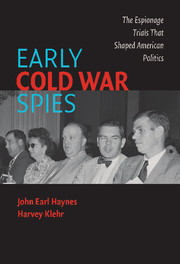Book contents
- Frontmatter
- Contents
- Series Editor's Foreword
- 1 Introduction: Early Cold War Spy Cases
- 2 The Precursors
- 3 Elizabeth Bentley: The Case of the Blond Spy Queen
- 4 The Alger Hiss–Whittaker Chambers Case
- 5 The Atomic Espionage Cases
- 6 Judith Coplon: The Spy Who Got Away with It
- 7 The Soble-Soblen Case: Last of the Early Cold War Spy Trials
- 8 Conclusion: The Decline of the Ideological Spy
- Index
- References
5 - The Atomic Espionage Cases
Published online by Cambridge University Press: 05 June 2012
- Frontmatter
- Contents
- Series Editor's Foreword
- 1 Introduction: Early Cold War Spy Cases
- 2 The Precursors
- 3 Elizabeth Bentley: The Case of the Blond Spy Queen
- 4 The Alger Hiss–Whittaker Chambers Case
- 5 The Atomic Espionage Cases
- 6 Judith Coplon: The Spy Who Got Away with It
- 7 The Soble-Soblen Case: Last of the Early Cold War Spy Trials
- 8 Conclusion: The Decline of the Ideological Spy
- Index
- References
Summary
If alger hiss's conviction for lying about his espionage activities jolted many Americans because of its message that high-ranking members of the American establishment had betrayed their country, the trial and conviction of Julius and Ethel Rosenberg for helping the Soviet Union steal atomic secrets angered and frightened the public. The popular conviction that Soviet possession of a weapon that left America vulnerable to atomic incineration was the result of treachery helped inaugurate what some critics called a witch-hunt and what others called a long-overdue focus on a more rigorous counterespionage program.
By the summer of 1941 theoretical advances in nuclear physics had led British scientists to conclude that building an atomic bomb using uranium was feasible. The Maud Committee submitted a report in September 1941 detailing a three-year effort to build a bomb (cover-named Tube Alloys) that was approved by the British military. The Soviet Union learned of the report within a week from John Cairncross, a young British civil servant who had been recruited as a Soviet spy while a student at Cambridge University in the 1930s. Meanwhile, American scientists were slowly gearing up to undertake a similar effort, and once America entered the war, President Roosevelt in 1942 ordered that it be made a leading war priority. British scientists and military industrial administrators also advised Prime Minister Churchill that the atomic bomb project required a tremendous investment of industrial assets and technical manpower, but British resources were then stretched thin by the demands of conventional military production.
- Type
- Chapter
- Information
- Early Cold War SpiesThe Espionage Trials that Shaped American Politics, pp. 138 - 191Publisher: Cambridge University PressPrint publication year: 2006

